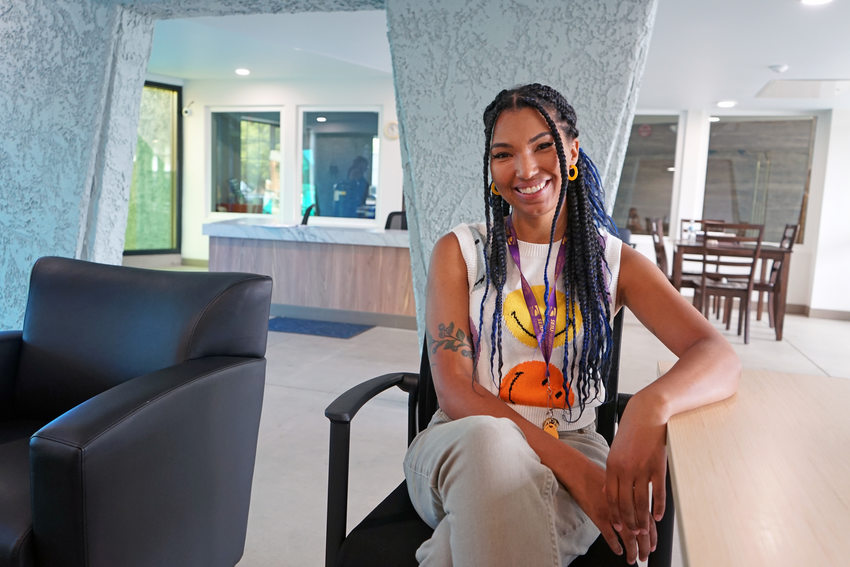Two years ago, Matthew was staying in a shelter run by the non-profit Do Good Multnomah. He had been battling a substance use disorder for years, attending rehabilitation programs with periods of sobriety between. With multiple barriers to accessing housing – including bad credit, an eviction and a criminal record – it was impossible to find housing. Meanwhile, he had gone through $30,000 in savings in one year by staying in hotels.
After Matthew’s stay in the Do Good Multnomah shelter, he went through several more treatment programs, eventually attaining a lasting sobriety with a new outlook that he attributes to his religious faith. “Addiction is a disease, and that struggle is real,” he explained. “Getting out of it takes every ounce of your soul.”
He later did an internship through Portland Community College as a case manager in a Central City Concern program where he had previously been a participant. This led him to decide that instead of using his mechanical engineering degree, he wanted to help people who have had experiences like his. “I wanted to work with people and give back what was what was given to me,” he said.
Today, Matthew is a case manager at Do Good Multnomah’s Findley Commons, a 35-apartment permanent supportive housing (PSH) complex in Northeast Portland for veterans who have experienced chronic homelessness and have a disability. These disabilities may include physical and mental conditions, as well as substance use disorder. As a veteran of the Navy Seabees, Matthew is able to draw on multiple elements of his lived experience to connect with and support residents.
Voters respond to the crisis with two key funding measures
Findley is one of many PSH apartment communities across greater Portland. This housing pairs an apartment with a rent subsidy and on-site services. It is widely recognized as the most effective way to address chronic homelessness.
For example, a recent study in Santa Clara County, Calif. placed individuals who were the most frequent users of medical, psychiatric and other emergency services in a PSH program. The study found that program participants had much higher rates of housing retention than individuals with similar needs who did not participate.
Looking at the bigger picture, research shows that a lack of affordable housing is the single strongest predictor of high homelessness rates in an area, both chronic and short-term. According to the most recent data from the National Low-Income Housing Coalition, the Portland area is short about 89,000 homes for households making 50% or less of the Area Median Income ($53,250 for a household of four).
To address this, voters passed Metro’s affordable housing bond in 2018. The $652.8 million in investments is currently forecasted to exceed its initial goal of 3,900 homes, for a projected total of 4,700 new affordable apartments across greater Portland.
Two years later in 2020, greater Portland voters passed Metro’s supportive housing services (SHS) measure to fund services for people experiencing housing instability or homelessness. As of the end of June, these funds have helped place almost 5,000 people in housing across greater Portland.
The combination of these two resources has enabled cities and counties to bring more PSH to the area. When these two funding sources work together, it means that more people exiting chronic homelessness and living with a disability can find long-term stability in homes they can afford, with services they need. Several bond-funded apartment communities, including Findley Commons, are entirely PSH, with services paid for by Metro’s SHS fund.
Danica: “It’s not just that you aren’t homeless anymore… but that you are going home”
Danica has been working at Heartwood Commons in Aloha since April. Heartwood Commons is a converted motel with 54 studio apartments and services managed by Community Partners for Affordable Housing. Washington county purchased and renovated the building with Metro bond funds, and opened it as first and only fully PSH apartment community in the county. Like Findley Commons, its case management and other resident services are paid for by Metro’s SHS fund.
As the resident services coordinator, Danica’s job is to bring community members and services to the building. She works alongside two housing case managers and a clinical case manager, who help residents with things like goal setting, connecting to employment and accessing healthcare resources. All services are voluntary, meaning residents engage at whatever level feels comfortable for them.

Danica previously worked as a housing case manager in youth shelters in Tacoma, Washington, where she helped shelter clients find permanent housing. Now she enjoys how her job is to support people who are already housed. “It’s really cool to have all of our folks in housing and then just spend my energy and focus on keeping them in housing, and how to make it sustainable for them,” she reflected.
That means creating, “hopefully a fun environment for them,” she said, “which is I think just as important as case management.” The idea is to make Heartwood Commons “a place where you come home and you want to be here.”
This includes things like supporting residents with a garden they started, organizing games of bingo, managing a lending library in partnership with Aloha Public Library, cooking healthy community dinners twice a week with help from residents, assisting residents with home care when requested and making sure everyone has access to food that meets their dietary needs. There’s also talk of a movie night in the community lounge and creating a community mural.
Danica’s favorite event so far was a partnership with Northwest Beauty College, where students came to Heartwood Commons and offered free haircuts to the residents. “Seeing the confidence of folks after they got those haircuts was really special,” Danica recalled.
Reflecting on her work at Heartwood Commons she explained, “It’s not just that you’re not homeless anymore, it’s not just that you’re not going to shelter anymore, but that you’re going home and you’re going home to Heartwood Commons. And you know that there are people there that care about you and there’s things for you to engage in.”
Ultimately, that means building trust. Long-term homelessness often includes repeated experience with various systems like shelters, healthcare and police. For this reason, on-site staff “kind of represent this system that fails a lot of people,” Danica said. “We’ve given people experiencing homelessness or people who have exited homelessness a lot of reasons to not trust us.” That’s why it means so much when she can see a resident starting to warm up to her, even if it’s just a smile.
“Feeling like people are settling in and starting to trust and buy into this community, I think is a direct result of the work that me and the case management staff and the property management staff have put in here. And that’s really, really cool to see.”
Leor: “I think grief is a major contributor to long-term houselessness”
“If you can imagine the worst day of your life on repeat over and over again, and there being no hope of that day ever getting better or ending, that’s what homelessness looks like,” Leor explained. As the permanent supportive housing program manager for the Urban League of Portland, Leor oversees a staff of 23 people across the organization’s housing programs.
Leor traces her interest in this work back to ten years ago, when she was experiencing what she described as the lowest point of her life. She imagined how amazing it would be to live in an apartment building with all of the support she needed on-site. “I kept dreaming of options that were not available at the time,” she remembered, “and thinking of ways like, if I ever get out of this circumstance, what can I do to make it better for the next woman as a single parent?”
The Urban League started out offering “scattered site” PSH, which means rent assistance and services for program participants living in homes across the city. That programming led to the Urban League’s first PSH apartment community, the 60-apartment Hattie Redmond in North Portland, which opened in April and was co-developed with Home Forward. Construction and development were funded in part by Metro’s housing bond and services are paid for by the SHS fund.
Similar to Findley and Heartwood Commons, services at the Hattie are designed to support residents transitioning out of chronic homelessness. This means food access, laundry services and recovery group sessions, in addition to help with things like criminal record expungement, obtaining an ID, applying for SSI and record retrieval. Residents also have access to peer support specialists if they need someone to talk to.
Since the building first started welcoming residents, Leor has seen people come together to form community in different ways. Some of the men started a safety group to patrol the building, while some of the women formed a women’s group to connect with each other and share insight and perspective on how they were able to get through domestic violence, homelessness and other challenges. There’s also a walking club and karaoke in the community room. Then on Fridays, a doctor named Michelle comes with her team to cook healthy meals for the residents.
Leor’s seen a transformation in many of the residents, who are starting to process trauma and heal from years of struggle. “I think grief is a major contributor to long-term houselessness,” she said. “Oftentimes we don’t really think about [how] our participants were grieving their former life yet still alive.” Now that they’re stably housed with the support they need, “It’s amazing to watch people that came in here with their head low, you know? And now they are beginning to take pride in their community. And they have their pets, they have their friends, their neighbors.”
The Urban League’s approach to this work is rooted in the ethos of members of Portland’s Black community supporting other members of the community. For the staff at the Hattie, “We’re the people that do the work, but we are also of the community,” Leor explained, “and it’s life changing for everybody that sets their hand to this work.”
Matthew: “I see success stories every day”
Like Leor and Danica, Matthew loves going to work every day knowing he’s making a positive impact on people’s lives. He helps residents with things like bus passes, food boxes, scheduling appointments and just being available as someone to talk to. However, he made it clear that he knows the residents are capable adults and wants to empower them to be self-sufficient. One of the coolest things about his job is when he sees someone realize they are actually able to do many things society has told them they’re not capable of.
Matthew is also transparent with residents about who he is and his experiences with homelessness and addiction. Echoing what Danica explained about the difficulty many people who have spent years on the street have building trust – especially with someone who’s perceived as an authority figure -– he wants them to know he’s not just “some dude who doesn’t care.”
This peer support model is a key part of Do Good Multnomah’s approach to supporting program participants. They prioritize hiring staff who have similar experiences as the population they serve to provide trauma-informed care and build real understanding and empathy. This means the organization is also a low-barrier employer, meaning that they hire employees who may have a difficult time finding employment due to a criminal record. “I have a passion to work with veterans because I am a veteran,” Matthew explained. “I have the same barriers as them. I was dealing with, you know, mental health, I was dealing with drug and alcohol addiction.”
Reflecting on his years on the street and his struggle to get into housing, Matthew wishes he had known about resources like PSH and the federal Veterans Affairs Supportive Housing program, which provides rent assistance for over half of the households at Findley Commons. “I had no clue about any of this,” he said. “If I would have known [these resources were] there, I wouldn’t have been homeless for so long.” He would like to see more outreach and education about these resources for people living unsheltered.
Over the past six months Matthew has seen the transformative impact of PSH on Findley’s residents. “I see success stories every day, whether somebody makes it to a dental appointment, or is able to come talk about something that’s causing PTSD and they’ve never been able to talk about, or they are just coming out of their unit,” he said. A lot of the residents have been homeless for a long time, he explained, so someone taking the steps toward a moment of connection and trust with another person is significant.
There are over 40 bond-funded apartment communities in some phase of development, with 13 that are complete and accepting residents. This includes hundreds of PSH homes with services, and in some cases rent assistance, paid for by Metro’s SHS fund. There are additional PSH homes in bond-funded buildings that are paid for with other funds.
This post was originally published on this site be sure to check out more of their content.








